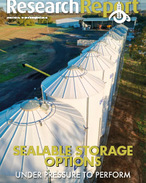This article is 8 years old. Images might not display.
The new product known as ecoSphere works by using solar and battery powered 4G base stations connected to sensors and tracking 4G and satellite information across an entire farming operation.
The network created by the ecoSphere system allows farmers to access long range connectivity to video, data and remote monitoring of assets and employees, all over a private network.
Pivotel Group CEO Peter Bolger said the custom designed mobile network uses 4G and satellite connectivity to create an entirely new offering for the Australian agricultural industry, focusing on safety and improved efficiencies.
"We are very proud to launch ecoSphere by Pivotel, an Australian-first system designed to solve the communication and connectivity needs of staff working and communicating in remote areas," Mr Peter Bolger.
Mr Bolger believes Pivotel has developed a highly affordable system and service that stands apart from other mobile carriers thanks to the group's expertise, unique network design and customer service.
"Our dedicated customer service team, product development and dealer network groups work hand-in-hand to offer tailor made and cost effective solutions to meet any problem faced by consumers and business entities, no matter how complex," he said.
"The radio network is designed to ensure agreed data rates and reliability metrics are delivered to all points on the site and the on-site local core network ensures the farm can continue to operate even when the off-site data link is down."
Mr Bolger said this new communication system from Pivotel can be installed and operated at a fraction of the cost typically charged by the large mobile carriers and will help deliver significant operational savings, particularly agriculture where the cost of implementing such solutions in the past have been prohibitive.
However reform to the telecommunications universal service obligation (USO) is ongoing, due to problems between major service providers Vodafone, Telstra and Optus over wholesale mobile domestic roaming agreements and competition for the federal government's mobile blackspot program.
A draft report into the nation's telecommunications USO in December showed major phone carriers claim to cover up to 99.3% of the population, which equates to about 31% of the country's landmass. Leaving regional and remote and Australia vastly under connected.
The Australian government's National Broadband Network (NBN) is also providing Sky Muster satellite services to the remotest 3% of Australia's population via the projection of 101 spot beams, but has faced complaints concerning connectivity and service faults.























